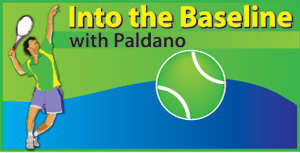CEO Craig Tiley’s management Australian Open of 2020
Australia’s contribution to foster tennis in the last seventy years is undisputable. With the development of technology and passing generations, the Australian Open which began in 1908, has upgraded its presentation of the game to match the electronic era, modern game and in suitable playing surface. Every Grand Slam is special. This year’s conducted in the midst of the disastrous bush fire need a commendable appreciation. The man behind Australian Open administration is their CEO Craig Tiley, since 2006.
Craig Tiley
Craig is 58 now, is another South African player like Dennis Van der Meer and Cliff Drysdale. Like them he too ended up in USA. After a professional career Craig became a known coach and a tennis administrator in USA. Craig has an incredible record as a coach and went to Australia as the head of player development in 2005.
Having experienced his innovative stroke teaching methods, I have to say he is something special. Of all the methods known in stroke making technique teaching, his is the easiest to assimilate by a player to be. In 2006 he took up to be the CEO of Tennis Australia. He has proved himself. Some of the top players in this year’s event were his former students. Doubles winner Ram, was his student in the university team he coached. Kevin Anderson of South Africa is another.
National sport management, creativity in events and player development will need superlative management skills and methods in the future. In this regard Craig Tiley’s leads will take the front seat. The Australian Open had a prize money of 71 million. All played went home with good money.
Sofia Kenin of USA
In tennis only one can win. With so many good players, being the one to win is not easy. Every Grand Slam has permitted one new name to surface in the last two years, especially in women. It started with Noami Osaka two years ago and this Australian Open has brought up the name of Sofia Kenin. In the same vein as Maria Sharapova, Sofia is also of Russian origin. Her parents migrated to USA and Sofia’s father worked as a taxi driver with poor English in New York and coached his daughter with limited knowledge. That is history now.
Sofia had a dream to win a Grand Slam at the age of seven. She says her father has never played the game but is incredibly smart and it showed in Sofia. In a count of 45 shots in the match against Garbine Mugurusa in the final, Sofia played 36 shots to the middle third of the court blocking all attack possibilities and out of the nine remaining she hit six winners. Her tactics trapped all her big name opponents repeatedly. She is twenty-one and youngest to win the Australian Open after Serena Williams in 2002.
Novak Djokovic – 17th Grand Slam
Along the road to the final, Djokovic lived up to his reputation. Dominic Theim his opponent in the final was the giant slayer, even beating Nadal. Theim played Djokovic for the 17th time in the final. Theim lead two sets to one against Djokovic at the end of the third set very comfortably. As to what happened to Theim from then on is a mystery. I saw no good reason Theim to lose the match other than his lack lustre stereotype tactical repertoire, even a ten-year-old beginner could have seen through.
 This made the final of the grand 2020 Australian Open to be an unfitting end. Theim relied on Djokovic’s errors, that did not come as it did in the second and third sets. At the conference Theim said that was his best. May be his road to the finals burnt him physically and emotionally. This can happen. The final had 304 rallies and the match lasted four hours.
This made the final of the grand 2020 Australian Open to be an unfitting end. Theim relied on Djokovic’s errors, that did not come as it did in the second and third sets. At the conference Theim said that was his best. May be his road to the finals burnt him physically and emotionally. This can happen. The final had 304 rallies and the match lasted four hours.
Performances
In Grand Slam events there is no guarantee of survival even if you are big name with good ranking. A good match I can distinctly remember, is the one between Milos Raonic and Stefanos Tisitsipas. Never has Raonic played that class of tennis. At the press conference after losing the match to Raonic in straight sets Tsitsipas said, “I did not know what to do, where to stand or which shot to play next.” It came from a top ten ranked player of the world. Another good match was Garbine Mugurusa playing Simona Halep. Power accuracy and speed dominated. It was great and complete tennis match the event saw.
In this Australian Open, it was the case with string of players, well placed as seeds in the draw not going the distance intended by the seeding process. This means the differences between players in the top 200 is ever narrowing. If a good player decides to take short forty winks of sleep, he or she will be beaten. This was always so in tennis. An exciting aspect and the reason Osaka, Osterpenko, and Barty had trouble winning.
Jabeur of Tunisia on the other hand had a great run. We will hear more of her in 2020. Djokovic and Federer played each other for the 50th time. Federer admitted that he played horrible. He too had five-set matches before.
A great athlete Caroline Wozniacki after losing to Jabeur retired from tennis at the Australian Open due to failing health. She got a fitting farewell from Craig Tiley.
—George Paldano, Int. competition player; Accredited Coach of German Tennis Federation; National coach Brunei, Sri Lanka; Davis-Cup, Federation-Cup.
geodano2015@gmail.com


